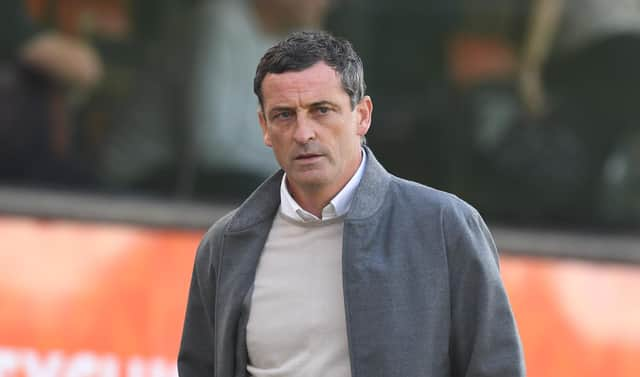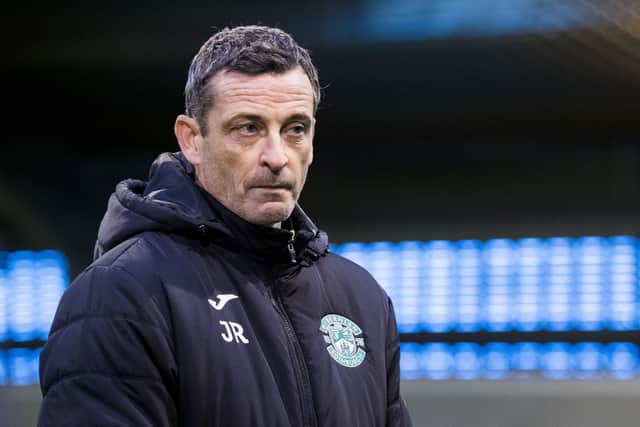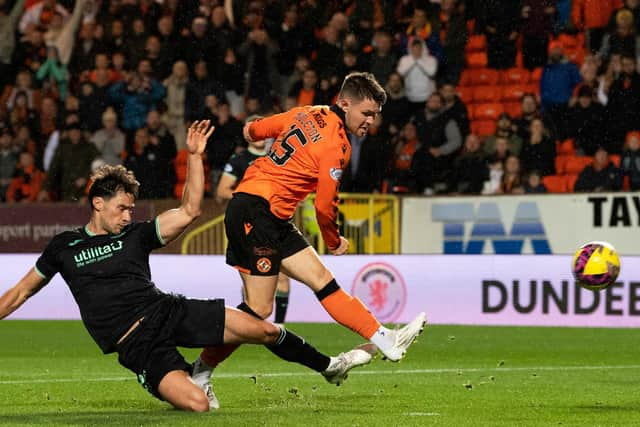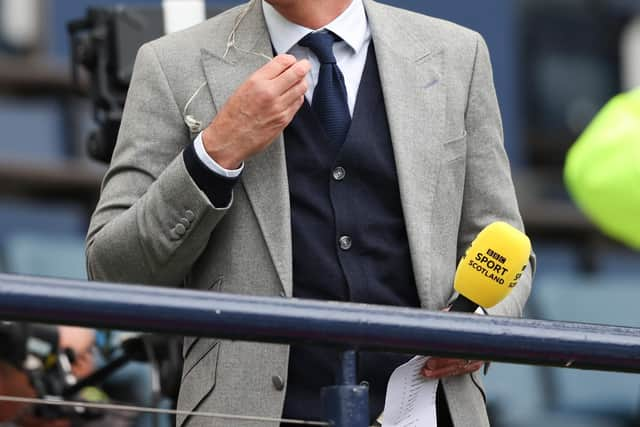Jack Ross opens up on Hibs, Dundee United, being director of football and brutality of management - 'It's become dehumanising'


Finished playing, that is. “I snapped my achilles in a testimonial match for the Sunderland kitman,” he explains. “I was attempting to run about like a significantly younger man and completely ruptured the tendon. That was back in May and I’m still not right. It was my worst injury by some considerable distance.”
But this is not the reason I’ve tracked down Ross, 46, to his Northumberland village home; rather, I want to know if he’s done with football management. In 2021, after guiding Hibernian to a national cup final, he was sacked ten days before the showpiece. Then in 2022, just seven games into his Dundee United career, he found himself unemployed again. After all that, would he really want to come back for more?
Advertisement
Hide AdAdvertisement
Hide AdMy interest is not ghoulish; whatever you might think of him as a manager he’s a personable, engaging fellow with considered insights and interviewing him at Easter Road in what tabloids would call “happier times”, I warmed to Ross more than I did predecessors like Paul Heckingbottom, Pat Fenlon and Colin Calderwood, all varying degrees of edgy in comparison. Two things he said that day stuck with me and I’m keen to find out if they’re still relevant.


Ross told me he was “in love” with football, drawing a distinction with those who merely love the game. And, unusually, for a young boss, he declared his ambition was to manage Scotland.
“Good questions, and it’s fair to ask them,” he says when we catch up via Zoom, Ross emphasising that until this moment he’s kept his own counsel. “How I view football now, I think my attitude has changed. I’m at a stage of my life, mid-forties, where people and not just men enter a period of reflection. We ponder what’s gone before and how the rest of our lives might look.”
The dad-of-two continues: “I reckon I would be doing this anyway, but the Hibs experience was scarring in the way it was ended and, well, the Dundee United experience speaks for itself. So how do I feel about management now? The job in the current climate is tough – very, very, very tough. In terms of average tenure in the role, how you’re judged and how quickly, it’s really brutal. I think it’s dehumanising.”
So he’s no longer dreaming of Scotland and big Hampden nights. “It can be weak to dismiss ambition based on you suddenly having a difficult time. However, there has to be realism. I’ve always set ambitions which I considered achievable and right now that one isn’t. Was it closer a wee while ago? Yes it was. Is it significantly further away now? I’m big enough to acknowledge that.”


A wee while ago the mood was oh so different. Remember the early-season Euro frenzy in the country of having three clubs qualified for group-stage and, after a thrilling night at Tannadice, the prospect of Dundee United joining them?
“Maybe I should quit now!” was Ross’s quip immediately following the first-leg win over AZ Alkmaar. Possibly he was remembering how Hibs’ humbling of Rangers in a League Cup semi-final had provided him with zero job security, but the words were prophetic and would turn up in the yearbook of best/worst football quotes in Christmas stockings. United were thrashed 7-0 in the return and shortly after that Celtic banged nine past them, sealing the manager’s fate.
With his two most recent clubs meeting at Easter Road today, and by the way neither of them any better off, Ross is potentially heading in a new direction. He has just submitted his latest 6,000 words towards a Masters in Sport Directorship at Manchester Metropolitan University with graduation due next year.
Advertisement
Hide AdAdvertisement
Hide AdJack Ross, director of football? It might happen. “Ever since my first degree when I was younger [MA in Economics from Heriot-Watt University] I’ve fancied getting back into learning because I really enjoy it. I think the director of football position is something I’d like to try. You can see how the role has grown across Europe and in England, although maybe not so much in Scotland.” But in our football, always capable of such punchy little ironies, Hibs have this week announced they’re reinstituting the post, hoping to eradicate past blunders.


Such as … getting rid of Ross? Well, one of the functions of a director of football, according to our man, is to act as a conduit between the manager and the boardroom. Hibs haven’t been winning cups for smooth lines of communication since the end of the Leeann Dempster era, or any kind of trophy for that matter. There’s a view that the club – to show that even though their owner was States-based, they were listening – pressed the panic button following a small but noisy protest after defeat at Livingston and the Twitter pile-on which followed.
After all, supremo Ron Gordon would admit later that the sacking had been a mistake. How did Ross feel when he heard that? “I would probably agree with him!” he laughs, “but it is what it is, you can’t rewind time. I’m still in touch with Ron. After losing my job we had a frank discussion. Recently he’s helped me with feedback for my Masters. Hibs for him at that time were a new environment. He’d been successful in the media sphere but football is different.”
In this game never say never so Ross insists he is not completely ruling out a return to the dugouts but his disenchantment with the manager’s lot as it exists right now is obvious. “It’s tough and it’s lonely,” he says, and there are plenty of casualties around.
“Just this month Matt Etherington went from Crawley Town after only three weeks while Grant McCann lasted only 11 months at Peterborough. Then there was Jim McIntyre, five months at Cove Rangers, and Paul Hartley, three months at Hartlepool. There are a lot of people in the world with very strong opinions of managers and I include pundits here.
“Management is unforgiving and there’s little sympathy. Unless you’re fortunate enough to be working in a nurturing, progressive environment then it’s becoming almost an impossible job.”
Ross joins the chattering classes every now and again – would he fancy a more regular TV or radio gig? “I’d be interested in punditry if it was a platform for proper analysis of games but I don’t think that’s how it functions in Scotland. We don’t examine football well enough. I’m guessing coverage is dictated by what it’s thought the audience wants. Some chat about all the managers under pressure or proper discussion about tactics, shape and the choices which impact on games? I prefer the latter.”
Now he’s had some time to mull it all over, what about Hibs and United would he have done differently? “Oh I don’t know. If you were to ask United they would probably say they made a bad choice – and maybe I did as well. Perhaps it just wasn’t meant to be there; that happens. But we only ever say that with the benefit of hindsight.
Advertisement
Hide AdAdvertisement
Hide Ad“I don’t look back with regret as I’ve always trusted the processes I’ve put in place at my clubs. You are seldom given credit for the culture you create and – hopefully – the positive feeling that exists and how you harness that. But I get it: managers are judged on results.
“I don’t think I would change what I did at either Hibs or United. Maybe the odd selection and substitution and some signings but in terms of the jobs and what I put into them because I know how committed I was – perhaps to a fault – I was obsessed with leaving behind a legacy in terms of the whole environment.” Then with a sigh he adds: “Unfortunately what I’ve learned from these experiences is that nobody really cares.”
He mentions hindsight again – a wonderful thing – when discussing social media and the mighty influence it can bring to bear on opinions, verdicts and ultimately livelihoods. Were you at the game, caller? No, but that’s not going to stop me commenting on the result in 280 characters. So many vicious vignettes. So much bad grammar! And how late it was, how late, when you ranted! Doesn’t matter. However weird and warped, Twitter is regarded as a barometer and right now it seems that the ill winds blowing through football are doing no managers any good.
“It’s peculiar because you’re rarely allowed a platform where you can properly articulate your thinking," Ross continues. "I’m not saying it would make people like you more but it might help them understand you a little better.
“During lockdown I toyed with the idea of a book about the manager’s mindset beginning before kick-off and over the 90 minutes of a game providing an insight into why you make the decisions you do. Of course, they’re all made in real time, not with hindsight.
“The truth is that every opinion comes with hindsight and the pundits are just as guilty. I like [now former England rugby coach] Eddie Jones who reckoned that the first time he did punditry he became the smartest person in the world. Everything he said was after the event: ‘He should have made that pass … That kick wasn’t on.’ If we all managed in hindsight the job would be a damn sight easier!”
When Ross was sacked by United – so abruptly and just eight months after his Easter Road exit – the Twitterati judge and jury took no time to deliver their verdict: “That’s it, he’s finished.” He says: “I didn’t dwell on that. If you do you’d rail against it. If it had been beyond fan perspective and was an opinion held professionally, ruling me out of future opportunities, then they wouldn’t have been the ones for me anyway. But I think if you were to look up former players, staff and owners – even the ones who got rid of me – they would speak positively about how I went about management and the qualities I believe I have. You’re right to ask if it’s dispiriting when deemed to be not very good. I’m not saying I’m brilliant but I reckon that over the course I’ve proved myself.”
At United he was allowed no time to re-enforce this but was able to manage Hibs to third place. Sceptics will point out that Hearts were out of the top flight that season and Aberdeen were poor, just as there’s an argument for United having stumbled into their Euro berth. Ah, but Ross also ensured regular visits to Hampden for Hibs. Once again, though, the sceptics have a retort: the three defeats were extremely painful for the fans, especially since in two of the competitions the Old Firm were nowhere to be seen. No matter that star players don’t turn up; it’s the manager who takes the rap. Still, Ross continues to have “huge affection” for Hibs and describes the opportunity to manage them as a “privilege”.
Advertisement
Hide AdAdvertisement
Hide AdBut that 9-0 at Tannadice was, he admits, especially bruising and his confidence took a hit. “The way I think about football, any time I lost a game as a manager I bore all the responsibility. If your analytical and your plan doesn’t work then immediately there’s self-doubt. What you would then do is move on quickly and being able to do that comes from the belief in your own abilities. But it would be remiss of me to say that when you lose a game like that Celtic one you don’t then question every single thing you do.
“That result was particularly challenging because I hadn’t been working in any different way from before. It hurt me enormously because to some degree you’re only noticed when you manage bigger clubs but I’d had to earn my right to coach from putting in three years at places like Dumbarton. I’ve got a lot of professional pride so that day was shattering.”
Celtic manager Ange Postecoglou said of Ross’s dismissal that football had “lost all its patience”. He appreciated his rival’s support and the fact it was “respectful, not over the top”, and when I ask Ross if he has sympathy for managers currently feeling the heat, most notably Lee Johnson at Hibs and Jim Goodwin at Aberdeen, he’s keen to offer it in the same non-patronising way. “I’m very, very respectful of the people who do the job because of all we’ve said about the difficulties of managing now. Jim and Lee have my utmost admiration. They’re walking in the same shoes, at clubs where the expectations … well, there are opinions about whether these match reality. But they’re always going to be only a couple of results away from being in difficulty.”
Ross, you won’t be surprised to learn, doesn’t use Twitter. But I tell him that if he did he would have noticed the odd cry from Leith of “Bring back Jack!” from the demanding Hibee support. Signing off to return to his studies he chuckles and says: “That pesky hindsight again! I don’t think they were talking like that before I got sacked. Now and again I bump into Sunderland fans who say their club should never have got rid of me. ‘Cheers for that,’ I tell them. ‘You might be a cheeky wee liar but it’s still nice to have met you!’”
Comments
Want to join the conversation? Please or to comment on this article.